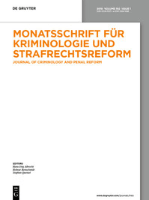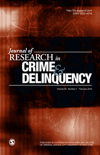
American Journal of Criminal Justice
Scope & Guideline
Transforming Understanding Through Rigorous Research
Introduction
Aims and Scopes
- Criminal Behavior Analysis:
The journal focuses on understanding the psychological, social, and environmental factors influencing criminal behavior, including studies on recidivism, violence, and substance abuse. - Law Enforcement Practices:
Research on policing strategies, decision-making processes, and the effects of law enforcement policies on communities, particularly regarding procedural justice and community relations. - Judicial Processes and Sentencing:
Examination of the judicial system, including prosecutorial discretion, sentencing disparities, and the impact of legislation on criminal justice outcomes. - Impact of Social Issues on Crime:
Analysis of how societal factors such as race, ethnicity, and socioeconomic status affect crime rates and perceptions of crime, including studies on neighborhood effects and community resilience. - Rehabilitation and Reintegration:
Focus on programs and practices aimed at rehabilitating offenders and facilitating their reintegration into society, including discussions on mental health support and educational initiatives. - Emerging Technologies and Crime:
Exploration of the implications of technology in criminal justice, including cybercrime, data analytics, and the use of body-worn cameras in policing.
Trending and Emerging
- Impact of COVID-19 on Crime:
A significant increase in research addressing how the COVID-19 pandemic has affected crime rates, law enforcement practices, and the judicial system. - Mental Health and Criminal Justice:
An emerging focus on the intersection of mental health issues within the criminal justice system, particularly regarding rehabilitation and the treatment of offenders. - Community and Restorative Justice:
Growing interest in community-based approaches to justice, emphasizing restorative practices, community resilience, and the role of social support in reducing recidivism. - Cybercrime and Digital Offenses:
Increased research on cybercrime, including the implications of digital technology on crime and law enforcement's response to online criminal activities. - Diversity and Inclusion in Criminal Justice:
A trend towards examining race, ethnicity, and gender within the criminal justice system, focusing on disparities in treatment, victimization, and outcomes. - Evidence-Based Practices in Policing:
A rising emphasis on the importance of evidence-based practices in law enforcement, including the evaluation of policing strategies and community engagement efforts.
Declining or Waning
- Traditional Crime Theories:
Research centered around classical theories of crime, such as deterrence and rational choice, has decreased as newer, more nuanced theories gain traction. - General Crime Statistics Reporting:
There has been a notable decline in papers focusing solely on traditional crime statistics without critical analysis or contextualization of the data. - Single-Factor Explanations of Crime:
Studies that attribute criminal behavior to a single factor, such as poverty or lack of education, are becoming less common as multi-faceted approaches are favored. - Focus on Specific Crime Types:
The journal has shifted away from narrow studies on specific crime types (e.g., property crime) in favor of broader analyses that encompass multiple dimensions of crime.
Similar Journals

Revista Brasileira de Direito Processual Penal
Bridging Theory and Practice in Procedural LawRevista Brasileira de Direito Processual Penal, published by the Instituto Brasileiro de Direito Processual Penal (IBRASPP), serves as a vital open-access platform for scholars and practitioners in the fields of criminal procedure law and social sciences. With an ISSN of 2359-3881 and an E-ISSN of 2525-510X, the journal has been committed to disseminating innovative legal research since its opening access in 2015, thus fostering engagement within legal academia. Based in Brazil and reaching an array of international contributors, it has achieved a respectable Q2 ranking in both Anthropology and Law categories as of 2023, appealing to a diverse audience interested in legal studies, sociology, and the interplay with mental health issues. The journal's ongoing commitment to excellence and impactful scholarship is reflected in its competitive standing across multiple Scopus ranks, making it a significant resource for researchers, legal professionals, and students looking to deepen their understanding of procedural law and its implications in contemporary society.

Psychology and Law
Fostering innovative research at the intersection of mind and justice.Psychology and Law, published by Moscow State Psychological & Pedagogical University, is an open-access journal dedicated to advancing knowledge at the intersection of psychology and legal studies. Since its establishment in 2011, the journal has provided a platform for high-quality research that addresses critical issues in applied, clinical, experimental, cognitive, and social psychology. Despite ranking in the Q4 quartile for various psychology categories in 2023, this journal remains committed to fostering insightful discussions and contributions to the field. Researchers and practitioners from diverse backgrounds are encouraged to explore its accessible content, which aims to enhance our understanding of psychological principles within legal contexts. The journal's ISSN is 2222-5196, and it primarily serves an international audience, promoting scholarly engagement and interdisciplinary collaboration. As the field evolves, Psychology and Law continues to be a vital resource for those seeking to bridge the gap between psychological research and legal practice.

JOURNAL OF CRIMINAL LAW & CRIMINOLOGY
Deepening Insights into Legal and Criminological TheoriesJournal of Criminal Law & Criminology, published by Northwestern University, is a premier scholarly journal dedicated to advancing the understanding of criminal law and criminological theories. Established in 1974, it has a strong history of publishing rigorous empirical research and critical analyses, contributing significantly to the discourse in legal and criminal justice studies. With an impressive impact factor and recognized as a Q1 journal in Law, it ranks favorably within the Scopus database, positioned in the top 25% of its category. This journal is essential for academics, legal practitioners, and students seeking insightful perspectives and developments in contemporary criminal justice issues. Although not open access, it provides a wealth of resources and discussions, making it an invaluable asset for anyone engaged in the study of law and criminology.

Monatsschrift fur Kriminologie und Strafrechtsreform
Pioneering Discussions in Crime and Legislation.Monatsschrift für Kriminologie und Strafrechtsreform is a prestigious academic journal dedicated to advancing the fields of criminology and legal reform. Published by WALTER DE GRUYTER GMBH in Germany, this journal boasts a significant history since its inception in 1943, continually evolving its focus and scope from 2010 to 2024 to address contemporary issues in law and criminal justice. With an impressive Q2 rating in Law and a ranking in the 46th percentile among social sciences law journals, it serves as a vital resource for researchers, practitioners, and students alike. By publishing innovative articles, critical reviews, and comprehensive studies, the journal aims to foster academic discourse and propel discussions surrounding legislative reforms and criminological theories. Although it does not currently offer open access, readers can obtain valuable insights that contribute to both academic scholarship and practical applications in the legal field, thereby enhancing the understanding of complex societal dynamics related to crime and law enforcement.

PSYCHOLOGY CRIME & LAW
Bridging Disciplines: Where Psychology Meets LawPSYCHOLOGY CRIME & LAW, published by Routledge Journals, Taylor & Francis Ltd, is a premier academic journal dedicated to the intersection of psychology, criminology, and the law. With an ISSN of 1068-316X and an E-ISSN of 1477-2744, this journal provides a critical platform for the dissemination of cutting-edge research and innovative methodologies in the fields of psychology, forensic medicine, and legal studies. Spanning over three decades (1994 to 2024), it holds impressive Scopus rankings, placing it in Q1 and Q2 quartiles for its contributions to law and forensic medicine, highlighting its standing within the academic community. PSYCHOLOGY CRIME & LAW is particularly noted for addressing contemporary issues at the crossroads of human behavior and legal standards, making it essential reading for scholars, practitioners, and students alike. While the journal is not open access, it offers valuable insights into a variety of topics, from criminal psychology to the implications of mental health in legal contexts, ensuring that it remains an influential resource for those engaged in research and professional practice.

Journal of Criminal Psychology
Pioneering interdisciplinary research at the intersection of psychology and law.Journal of Criminal Psychology, an esteemed publication by EMERALD GROUP PUBLISHING LTD, serves as a pivotal resource in the interdisciplinary study of criminal behavior through the lenses of psychology and law. Since its inception in 2011, this journal has significantly contributed to the understanding of psychological principles as they apply to crime, law enforcement, and social justice, making it a vital source for both researchers and practitioners. With a commendable ranking of Q1 in Law and Q3 in Applied and Social Psychology for 2023, the journal guarantees high-quality research findings that can influence policy and practice across these domains. Although it does not offer open access, its rigorous peer-review process ensures that every published article adheres to the highest academic standards. The Journal of Criminal Psychology not only fosters academic discourse but also drives innovation in criminal justice practices, making it essential reading for anyone dedicated to the enhancement of ethical standards in legislation and law enforcement.

Journal of Criminal Law
Pioneering Research in the Realm of LawWelcome to the Journal of Criminal Law, a prestigious publication in the field of legal studies, expertly published by SAGE Publications Ltd. With a rich history that dates back to 1937, this journal has been a vital platform for disseminating innovative research and critical analyses pertaining to criminal law and justice issues. The journal boasts a commendable Q2 ranking in the Law category for 2023, placing it among the top tier of legal publications. It is recognized for its impactful contributions, as indicated by its impressive Scopus Rank of #346 out of 1025 in the Social Sciences - Law category, positioning it within the 66th percentile. Although it does not currently offer open access options, researchers, professionals, and students will find a wealth of rigorously peer-reviewed articles that address contemporary challenges and developments in criminal law. Based in the United States, the journal is committed to fostering scholarly dialogue and advancing understanding in an ever-evolving legal landscape.

JOURNAL OF RESEARCH IN CRIME AND DELINQUENCY
Shaping policies through rigorous examination of crime trends.JOURNAL OF RESEARCH IN CRIME AND DELINQUENCY, published by SAGE PUBLICATIONS INC, stands as a premier outlet for groundbreaking research in the fields of crime and delinquency. With an ISSN of 0022-4278 and an E-ISSN of 1552-731X, this esteemed journal has been disseminating vital knowledge since 1964 and continues to do so with a forward-looking perspective extending to 2024. Renowned for its impactful contributions, the journal ranks in the Q1 quartile of Social Psychology for 2023, reflecting its status among the top-tier publications in the field with a Scopus ranking of 66/310, placing it in the 78th percentile. Though it is not an Open Access journal, it remains a crucial resource for researchers, professionals, and students seeking to deepen their understanding of criminal behavior and social responses. With articles that address current issues and trends, JOURNAL OF RESEARCH IN CRIME AND DELINQUENCY plays an essential role in shaping policies and practices within the criminal justice system and academia.

International Journal of Criminal Justice Sciences
Advancing criminal justice through innovative research.The International Journal of Criminal Justice Sciences is a premier academic publication dedicated to advancing the field of criminal justice through rigorous research and innovative scholarship. Published by MANONMANIAM SUNDARANAR UNIVERSITY in India, this Open Access journal has been a vital platform for researchers since 2006, promoting unrestricted access to critical knowledge and insights in the realm of law and criminal justice. With a commendable Scopus ranking of #379 out of 1025 in the Social Sciences - Law category, placing it in the 63rd percentile, it holds an essential position for those engaged in legal studies. The journal is particularly beneficial for academics, practitioners, and students aiming to explore contemporary issues, innovative practices, and theoretical advancements in the discipline. Its commitment to quality research is reflected in its Q3 Quartile designation and the continuous convergence of research contributions anticipated from 2017 to 2024. Whether you are looking to publish your findings or seek valuable insights from peer-reviewed articles, the International Journal of Criminal Justice Sciences remains an indispensable resource for fostering knowledge and dialogue in this critical field.

Journal of Police and Criminal Psychology
Innovating Practices in Police Psychology and Criminal JusticeThe Journal of Police and Criminal Psychology, published by Springer, is a leading scholarly periodical that explores the intricate intersections of psychological principles and law enforcement practices. Founded in 1985, this esteemed journal serves as an essential resource for researchers, practitioners, and students alike, addressing contemporary issues in applied psychology and law, and has achieved a commendable position in its field, with a 2023 Scopus ranking of #128 in Law and #123 in Applied Psychology. With an impressive impact factor, it reflects the journal's commitment to advancing knowledge and fostering dialogues surrounding criminal behavior, law enforcement strategies, and psychological assessments. The journal maintains a non-open access model, ensuring rigorous peer-review standards while reaching a global audience interested in the psychological dimensions of criminal justice. As it continues to converge into 2024, the Journal of Police and Criminal Psychology remains dedicated to fostering groundbreaking research and facilitating critical insights that inform policy and practice in police psychology.